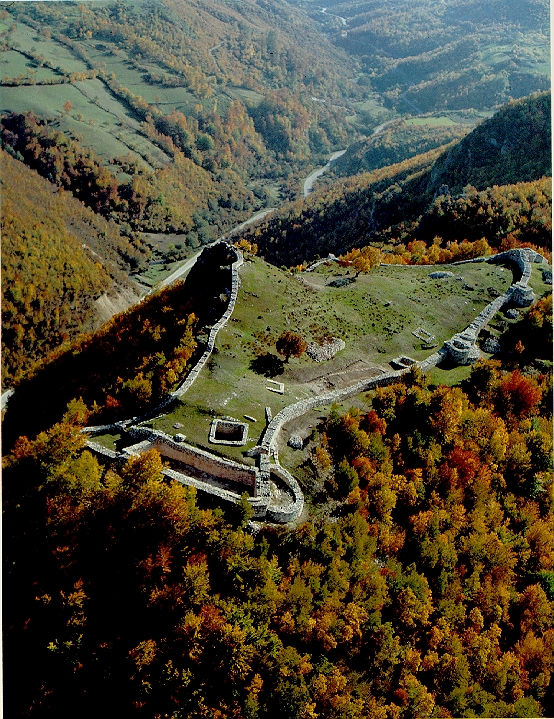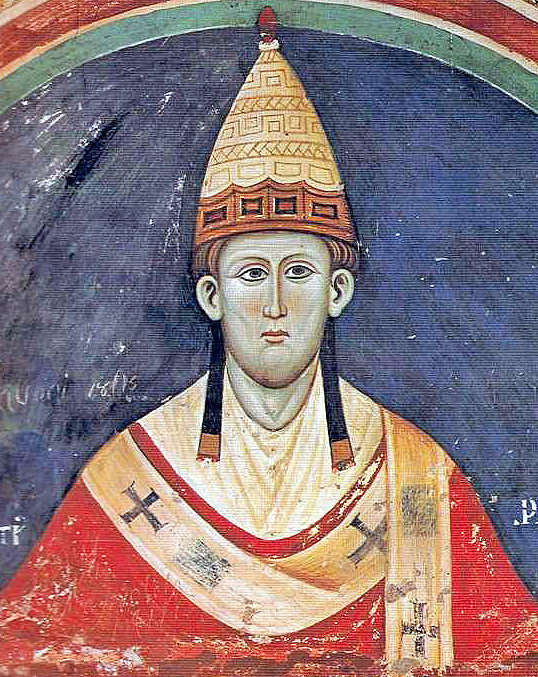|
Progon Of Kruja
Progon was the first Albanian ruler known by name, an ''archon'' of the Kruja Fortress (modern Krujë) and its surroundings, known as the Principality of Arbanon. He ruled between 1190 and 1198. Progon was succeeded by his two sons, Gjin, and Dimitri. Life Progon's realm was the first Albanian state during the Middle Ages.Clements 1992, p. 31 ''"By 1190, Byzantium's power had so receded that the archon Progon succeeded in establishing the first Albanian state of the Middle Ages, a principality"''Pickard-Çeliku 2008, p. 16Norris 1993, p. 35 Little is known about ''archon'' Progon who was the first ruler of Kruja and its surroundings, between 1190 and 1198.Frashëri 1964, p. 42 ''"The territories of this principality extended over the present- day districts of central Albania. Its capital was at Kruja. The first ruler of the Principality of Arberia was Archon Progon (1190-1198) about whose life and doings we know.."'' The Kruja fortress stayed in the possession of the Progon fam ... [...More Info...] [...Related Items...] OR: [Wikipedia] [Google] [Baidu] |
Gjin Progoni
Gjin Progoni ( la, Ginius) was an ''archon'' (or lord) of Kruja, located in present-day Albania, from c. 1198 until his death in 1208.: "Even if it is hard to identify the outlook of Prince Gjin, the son of Progon, who died in 1208, it is clear that his successor, Dhimitër, saw Venice as the main enemy..." He succeeded his father, Progon of Kruja, becoming the second ruler of the House of Progon. Gjin was succeeded by his younger brother Dhimitër Progoni. See also *History of Albania *Monarchs of Albania References Citations Sources * {{DEFAULTSORT:Progoni, Gjin 12th-century births 1208 deaths Progon family, Gjin Albanian monarchs, Gjin Albanian princes, Gjin Medieval Albanian nobility 12th-century Albanian people 13th-century Albanian people ... [...More Info...] [...Related Items...] OR: [Wikipedia] [Google] [Baidu] |
Serbian Grand Principality
Grand Principality of Serbia ( sr, Великожупанска Србија, Velikožupanska Srbija), or Rascia ( sr, Рашка, Raška), was a medieval Serbs, Serbian state that existed from the second half of the 11th century up until 1217, when it was transformed into the Kingdom of Serbia (medieval), Kingdom of Serbia. Initially, the Grand Principality of Serbia emerged in the historical region of Raška (region), Raška ( sr-Cyrl, Рашка; la, Rascia), and gradually expanded, during the 12th century, encompassing various neighboring regions, including territories of modern Montenegro, Herzegovina, and southern Dalmatia. It was founded by Grand Prince Vukan I of Serbia, Vukan, who initially ( 1082) served as regional governor of Raška, appointed by King Constantine Bodin. During Byzantine-Serbian wars ( 1090) Vukan gained prominence and became self-governing ruler in inner Serbian regions. He founded the Vukanović dynasty, that ruled the Grand Principality. Through dip ... [...More Info...] [...Related Items...] OR: [Wikipedia] [Google] [Baidu] |
12th-century Byzantine People
1 (one, unit, unity) is a number representing a single or the only entity. 1 is also a numerical digit and represents a single unit of counting or measurement. For example, a line segment of ''unit length'' is a line segment of length 1. In conventions of sign where zero is considered neither positive nor negative, 1 is the first and smallest positive integer. It is also sometimes considered the first of the infinite sequence of natural numbers, followed by 2, although by other definitions 1 is the second natural number, following 0. The fundamental mathematical property of 1 is to be a multiplicative identity, meaning that any number multiplied by 1 equals the same number. Most if not all properties of 1 can be deduced from this. In advanced mathematics, a multiplicative identity is often denoted 1, even if it is not a number. 1 is by convention not considered a prime number; this was not universally accepted until the mid-20th century. Additionally, 1 is the s ... [...More Info...] [...Related Items...] OR: [Wikipedia] [Google] [Baidu] |
Albanian Princes
Albanian may refer to: *Pertaining to Albania in Southeast Europe; in particular: **Albanians, an ethnic group native to the Balkans **Albanian language **Albanian culture **Demographics of Albania, includes other ethnic groups within the country *Pertaining to other places: **Albania (other) **Albany (other) **St Albans (other) *Albanian cattle *Albanian horse *''The Albanian'', a 2010 German-Albanian film See also * *Olbanian language *Albani people *Albaniana (other) *Alba (other) Alba is the Scottish Gaelic name for Scotland. Alba or ALBA may also refer to: Arts, entertainment and media Fictional characters * Alba ''(Darkstalkers)'', a character in the Japanese video game * Alba (''The Time Traveler's Wife''), a chara ... {{Disambiguation Language and nationality disambiguation pages ... [...More Info...] [...Related Items...] OR: [Wikipedia] [Google] [Baidu] |
Albanian Monarchs
Albanian may refer to: *Pertaining to Albania in Southeast Europe; in particular: **Albanians, an ethnic group native to the Balkans **Albanian language **Albanian culture **Demographics of Albania, includes other ethnic groups within the country *Pertaining to other places: **Albania (other) **Albany (other) **St Albans (other) *Albanian cattle *Albanian horse *''The Albanian'', a 2010 German-Albanian film See also * *Olbanian language *Albani people *Albaniana (other) *Alba (other) Alba is the Scottish Gaelic name for Scotland. Alba or ALBA may also refer to: Arts, entertainment and media Fictional characters * Alba ''(Darkstalkers)'', a character in the Japanese video game * Alba (''The Time Traveler's Wife''), a chara ... {{Disambiguation Language and nationality disambiguation pages ... [...More Info...] [...Related Items...] OR: [Wikipedia] [Google] [Baidu] |
1198 Deaths
Year 1198 ( MCXCVIII) was a common year starting on Thursday (link will display the full calendar) of the Julian calendar. Events By place Europe * March 8 – Philip of Swabia, son of the late Emperor Frederick I, is elected "King of Germany" by his supporters at Mühlhausen in Thuringia. Archbishop Adolf of Cologne elects Otto of Brunswick, son of Henry the Lion, as Philip's rival. Otto IV is crowned as King of the Romans in Aachen by supporters of the House of Welf. Philip's coronation does not take place until September 8, at Mainz. * May 17 – Frederick II, infant son of the late Emperor Henry VI, is crowned King of Sicily. His mother, Queen Constance I becomes regent, while she surrounds herself with local advisors. On November 27, Constance dies in the royal palace at Palermo. She is succeeded by the new pope, Innocent III, who becomes Frederick's guardian and mentor. England * John of England captures a party of 18 French knights and man ... [...More Info...] [...Related Items...] OR: [Wikipedia] [Google] [Baidu] |
12th-century Births
1 (one, unit, unity) is a number representing a single or the only entity. 1 is also a numerical digit and represents a single unit of counting or measurement. For example, a line segment of ''unit length'' is a line segment of length 1. In conventions of sign where zero is considered neither positive nor negative, 1 is the first and smallest positive integer. It is also sometimes considered the first of the infinite sequence of natural numbers, followed by 2, although by other definitions 1 is the second natural number, following 0. The fundamental mathematical property of 1 is to be a multiplicative identity, meaning that any number multiplied by 1 equals the same number. Most if not all properties of 1 can be deduced from this. In advanced mathematics, a multiplicative identity is often denoted 1, even if it is not a number. 1 is by convention not considered a prime number; this was not universally accepted until the mid-20th century. Additionally, 1 is the ... [...More Info...] [...Related Items...] OR: [Wikipedia] [Google] [Baidu] |
Progonos (other)
{{hndis ...
Progonos ( gr, Πρόγονος) means "forefather" or "ancestor" and may refer to: *Progon, Lord of Kruja or Progonos (fl. 1190-1198), first Albanian ruler *Progonos Sgouros (fl. 1294-1300), Byzantine military commander See also *Progon (other) Progon may refer to: * House of Progon, 12–13th century Albanian monarchs * Progon family, established the first Albanian state, the Principality of Arbër * Progon, Lord of Kruja, a late 12th-century Byzantine-Albanian lord and first known Alba ... [...More Info...] [...Related Items...] OR: [Wikipedia] [Google] [Baidu] |
Lord
Lord is an appellation for a person or deity who has authority, control, or power over others, acting as a master, chief, or ruler. The appellation can also denote certain persons who hold a title of the peerage in the United Kingdom, or are entitled to courtesy titles. The collective "Lords" can refer to a group or body of peers. Etymology According to the Oxford Dictionary of English, the etymology of the word can be traced back to the Old English word ''hlāford'' which originated from ''hlāfweard'' meaning "loaf-ward" or "bread-keeper", reflecting the Germanic tribal custom of a chieftain providing food for his followers. The appellation "lord" is primarily applied to men, while for women the appellation " lady" is used. This is no longer universal: the Lord of Mann, a title previously held by the Queen of the United Kingdom, and female Lords Mayor are examples of women who are styled as "Lord". Historical usage Feudalism Under the feudal system, "lord" had a ... [...More Info...] [...Related Items...] OR: [Wikipedia] [Google] [Baidu] |
Republic Of Venice
The Republic of Venice ( vec, Repùblega de Venèsia) or Venetian Republic ( vec, Repùblega Vèneta, links=no), traditionally known as La Serenissima ( en, Most Serene Republic of Venice, italics=yes; vec, Serenìsima Repùblega de Venèsia, links=no), was a sovereign state and Maritime republics, maritime republic in parts of present-day Italy (mainly Northern Italy, northeastern Italy) that existed for 1100 years from AD 697 until AD 1797. Centered on the Venetian Lagoon, lagoon communities of the prosperous city of Venice, it incorporated numerous Stato da Màr, overseas possessions in modern Croatia, Slovenia, Montenegro, Greece, Albania and Cyprus. The republic grew into a Economic history of Venice, trading power during the Middle Ages and strengthened this position during the Renaissance. Citizens spoke the still-surviving Venetian language, although publishing in (Florentine) Italian became the norm during the Renaissance. In its early years, it prospered on the salt ... [...More Info...] [...Related Items...] OR: [Wikipedia] [Google] [Baidu] |
Stefan Nemanjić
Stefan Nemanja II ( sr-Cyrl, Стефан Немања II, ), or Stephen the First-Crowned ( sr, / , ; – 24 September 1228), was the Grand Prince of Serbia from 1196 and the King of Serbia from 1217 until his death in 1228. He was the first Rascian king; due to his transformation of the Serbian Grand Principality into the Kingdom of Serbia and the assistance he provided his brother Saint Sava in establishing the Serbian Orthodox Church, he is regarded one of the most important members of the Nemanjić dynasty. Early life Stefan Nemanjić was the second-eldest son of Grand Prince Stefan Nemanja and Anastasija. His older brother and heir apparent, Vukan, ruled over Zeta and the neighbouring provinces (the highest appanage) while his younger brother Rastko (later known as ''Saint Sava'') ruled over Hum. The Byzantines attacked Serbia in 1191, raiding the banks of the South Morava. Nemanja had a tactical advantage, and began to raid the Byzantine armies. Isaac II Angelo ... [...More Info...] [...Related Items...] OR: [Wikipedia] [Google] [Baidu] |




